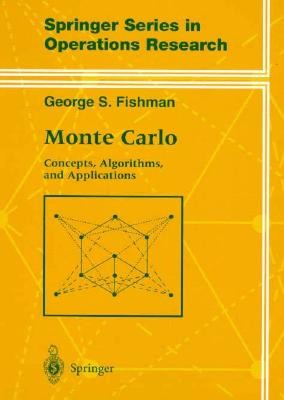| Monte Carlo: Concepts, Algorithms, and Applications Contributor(s): Fishman, George (Author) |
|
 |
ISBN: 038794527X ISBN-13: 9780387945279 Publisher: Springer OUR PRICE: $132.99 Product Type: Hardcover Published: April 1996 Annotation: This volume presents a comprehensive first course in the Monte Carlo method which will be suitable for graduate and undergraduate students in the mathematical sciences and engineering, principally operations research, statistics, mathematics, and computer science. The reader is assumed to have a sound understanding of calculus, introductory matrix analysis, probability, and intermediate statistics, but otherwise the book is self-contained. As well as a thorough exploration of the important concepts of the Monte Carlo method, the volume includes over 90 algorithms which allow the reader to move rapidly from the concepts to putting them into practice. The book also contains numerous exercises, many of them hands-on implementations of selected algorithms to demonstrate the application of these ideas in realistic settings. Software, freely available via ftp and portable across computing platforms, provides programs for pseudorandom number generation and statistical sample path data analysis. The software is suitable for use with the exercises as well as for more general applications. For professional mathematical scientists and engineers this book provides a ready reference to the Monte Carlo method, especially to implementable algorithms for performing sampling experiments on a computer and for analyzing their results. |
| Additional Information |
| BISAC Categories: - Mathematics | Probability & Statistics - General - Business & Economics | Operations Research - Business & Economics | Statistics |
| Dewey: 519.282 |
| LCCN: 95017144 |
| Series: Springer Operations Research and Financial Engineering |
| Physical Information: 1.71" H x 7.29" W x 9.56" (3.01 lbs) 698 pages |
| Descriptions, Reviews, Etc. |
| Publisher Description: This book provides an introduction to the Monte Carlo method suitable for a one-or two-semester course for graduate and advanced undergraduate students in the mathematical and engineering sciences. It also can serve as a reference for the professional analyst. In the past, my inability to provide students with a single- source book on this topic for class and for later professional reference had left me repeatedly frustrated, and eventually motivated me to write this book. In addition to focused accounts of major topics, the book has two unifying themes: One concerns the effective use of information and the other concerns error control and reduction. The book describes how to incorporate information about a problem into a sampling plan in a way that reduces the cost of estimating its solution to within a specified error bound. Although exploiting special structures to reduce cost long has been a hallmark of the Monte Carlo method, the propen- sity of users of the method to discard useful information because it does not fit traditional textbook models repeatedly has impressed me. The present account aims at reducing the impediments to integrating this information. Errors, both statistical and computational, abound in every Monte Carlo sam- pling experiment, and a considerable methodology exists for controlling them. |